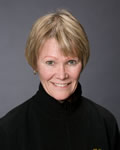LCO’s scholar-in-residence undertakes study of news gathering and the Charter
 Nearly 30 years after the Canadian Charter of Rights and Freedoms was signed into law, Jamie Cameron says questions remain about the role of a free press in democracy.
Nearly 30 years after the Canadian Charter of Rights and Freedoms was signed into law, Jamie Cameron says questions remain about the role of a free press in democracy.
“There’s a significant literature in Canada discussing freedom of expression, but very little on freedom of the press,” says the Osgoode professor and specialist in constitutional law. “The timing is perfect to undertake a research project on news gathering and freedom of the press.”
That’s exactly Cameron’s plan for her six-month tenure as LCO’s scholar-in-residence. Drawing on two recent Supreme Court decisions — one involving a Globe and Mail reporter who relied on a confidential source for key information about the Quebec sponsorship program and a second involving a National Post reporter’s right to cite source privilege in a story pertaining to then prime minister Jean Chretien’s role in “Shawinigate” — Cameron is analysing the importance of journalist-source privilege and how that relationship is protected under section 2(b) of the Charter. Beyond scholarly output, she hopes her research, and the resulting recommendations, generate momentum for legislative reform.
“I’m strongly committed to the rights of journalists and their sources.”
Cameron’s passion was ignited last year when she represented the Canadian Civil Liberties Association in the National Post and Globe and Mail cases. The CCLA took the view that the courts should recognize journalist-source privilege and grant it protection under the Charter. The Supreme Court concluded otherwise and Cameron’s research project was hatched. As part of her study, she’s planning three articles: a critique of the Supreme Court cases involving source privilege; an analysis of what freedom of press means under the Charter; and — in what she calls a “hugely ambitious” step forward — recommendations on legislative reform.
A second phase of the study will look at publication bans and the principles of openness in the courts.
The entire project will culminate this fall in a conference co-organized by the LCO and Osgoode Hall Law School and involving academics, lawyers and journalists debating the role of the press in a democracy.
“It will be ground-breaking,” Cameron predicts. “These issues haven’t been looked at in a systemic way in a very long time.”

